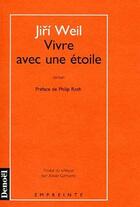-
Nombre de pages : (-)
-
Collection :
(-)
-
Genre :
(-)
-
Thème :
Non attribué
-
Prix littéraire(s) :
(-)
Résumé:
'Weil writes about savagery and pain with a brevity that in itself seems the fiercest commentary that can be made on the worst that life has to offer.' Philip Roth 'Comic, sardonic and deeply moving . . . we ignore such rich literature at our cultural peril.' Simon Mawer 'A brilliant, bitter... Voir plus
'Weil writes about savagery and pain with a brevity that in itself seems the fiercest commentary that can be made on the worst that life has to offer.' Philip Roth 'Comic, sardonic and deeply moving . . . we ignore such rich literature at our cultural peril.' Simon Mawer 'A brilliant, bitter satire that gradually turns into tragedy. Unmissable.' The Times 'A brilliant novel . . . Jirí Weil was a writer who witnessed the worst of this century and testified to his experience in works of unflinching and astonishing literary vision.' New York Times 'Weil had advantages that would in themselves ensure that his work stood out on the black mountain of Holocaust literature. He was there.' Guardian SS officer Julius Schlesinger is ordered to remove the statue of the Jewish composer Mendelssohn from the roof of the Prague Academy of Music before an official concert. Unsure which amongst the decorative statues is Mendelssohn, he tells his men to remove the statue with the biggest nose. Unfortunately, this is the statue of Wagner . . . This darkly comic and deeply moving novel traces the transformation of ordinary lives during the Nazi occupation of Prague. A Jewish man works in a warehouse of confiscated property, delivering the belongings of deported Jews to new owners. Two small girls hide in an apartment for weeks, catching glimpses of the world outside through cracks in the curtains. Weil tells the story of the struggle to survive in a labyrinthine regime, where humour, as well as great courage, are required to retain hope and humanity.
Donner votre avis









